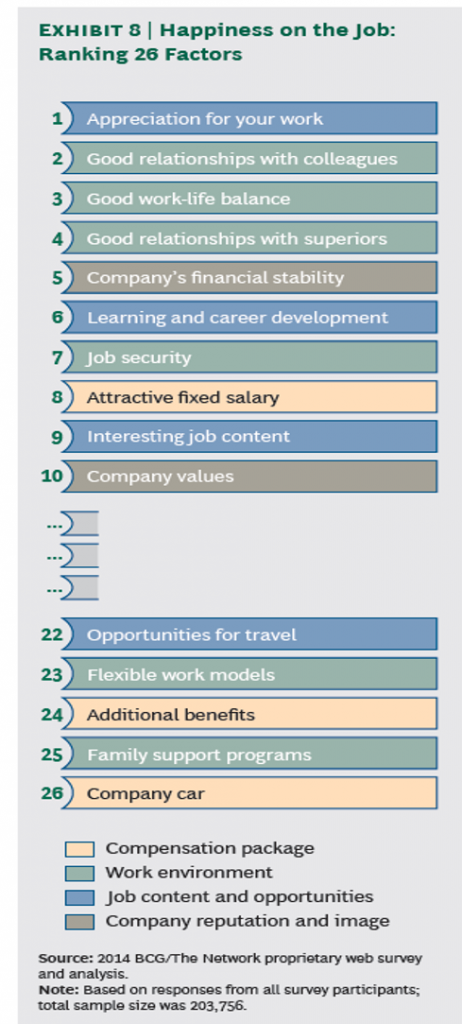“They are different in [insert country other than your own.] They want different things than we do.”
How true do you believe that statement to be? Do you wonder if anyone’s recently tried to quantify those perceived differences or, better yet, find the commonalities?
This Fall, the Boston Consulting Group (BCG) and The Network did just that in their Decoding Global Talent report, which aggregated 200,000 survey responses on global mobility and employment preferences from employees in 189 countries. The survey primarily looked at what would make employees willing to work abroad, regardless of home country.
But one particular finding struck me as most enlightening – regardless of desire to relocate, all respondents “are putting more emphasis on intrinsic rewards and less on compensation.”
“You must be appreciated”
This chart (Exhibit 8, below, titled Happiness on the Job: Ranking 26 Factors) from the report shows the most important job elements to survey respondents, with appreciation for work and relationships with others leading the list.
 It’s no surprise that “appreciation for your work” leads the list.
It’s no surprise that “appreciation for your work” leads the list.
We need to know our work matters. One survey respondent, a logistics supervisor in Morocco, put it best: “What you do is what you are and what you are is what you do. You must be appreciated.”
We invest so much of ourselves in our work. We need to know that others notice and appreciate our efforts. It’s more powerful validation than a paycheck alone, and a basic human need.
Good relationships with those with whom we spend the majority of our time is no less a need. That’s why it’s also not a surprise that good relationships with colleagues and supervisors also top the list.
Increasing commitment
Indeed, the top two key findings of our most recent Globoforce Fall 2014 Workforce Mood Tracker report found that:
- Peer relationships are critical to the modern work experience because of amount of time we invest at work; and,
- Having friends at increases commitment to the company.
The global study from the Boston Consulting Group pointed to an additional finding on relationships at work I found fascinating. Level in the organizations determines, in part, the types of relationships I value most. That’s why peer recognition and appreciation programs are vital to employee happiness and engagement at work.
Workers lower down on the hierarchy assign more importance to their relationships with colleagues than to their relationships with superiors — exactly the opposite of higher-level managers.”
A world where money isn’t everything
And finally, the importance of these factors to recruiting and retaining employees cannot be underestimated. The BCG report summarizes this way:
Even as employers have begun to modify the branding they use to recruit workers — correctly anticipating the shift to a post-crisis world in which money isn’t everything — companies have not really done much to push their reward systems toward new and compelling “total offers” that include many of the attributes relating to culture, relationships, and appreciation that employees covet these days.
Instead, company rewards are still largely built around compensation, and the culture inside many companies remains hierarchical, with complex guidelines, limited flexibility, and highly political agendas. It’s the rare employer that has found a way to institutionalize appreciation — the attribute that workers, especially younger workers of Generation Y, now seem to crave…
But there need to be other kinds of expertise, too. In particular, HR needs to find ways to get more involved in shaping corporate culture, in encouraging meaningful relationships between and among bosses and workers, and in ensuring that appreciation for a job well done gets the company-wide attention it deserves. Otherwise, the most talented employees will leave and companies will face a strategic disadvantage.”
Appreciation for a job well done
There no more effective, efficient way to shape culture, encourage meaningful relationships, or ensure appreciation for a job well done than a social recognition program that encourages all employees to frequently, sincerely and specifically recognize and praise their colleagues for good work in line with company core values.
This is what is proven to build cultures of recognition quickly across global organizations — both big and small.
What is your most important job element?
You can find more from Derek Irvine on his Recognize This! blog.
